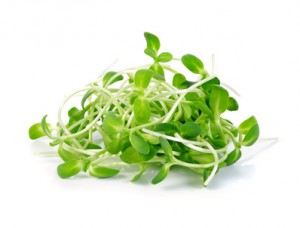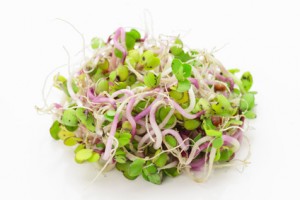The use of sprouts as medicine, dates back in Chinese history since 3000 B.C.
The practice of sprouting, and the use of sprouts as medicine, dates back in Chinese history since 3000 B.C. There are documents of sprouted wheat, millet, or barley, called nieh, eaten like cereals. During Neolithic times in China, the first wine was created using cooked rice with sprouted grains (li). In Chinese medicine we see the use of sprouted barley malt (mai ya). In the Chinese Materia medica, written during the Ming Dynasty by Li Shizhen, also describes the medicinal benefits of sprouts.
Our times have changed, but not much has with sprouts. We can no longer get enough nutrition from the vegetables and fruits grown in our soil anymore. In fact, in some produce certain vitamins are just not there anymore. Just read this passage from Scientific American.
“A landmark study on the topic by Donald Davis and his team of researchers from the University of Texas (UT) at Austin’s Department of Chemistry and Biochemistry was published in December 2004 in the Journal of the American College of Nutrition. They studied U.S. Department of Agriculture nutritional data from both 1950 and 1999 for 43 different vegetables and fruits, finding “reliable declines” in the amount of protein, calcium, phosphorus, iron, riboflavin (vitamin B2) and vitamin C over the past half century. Davis and his colleagues chalk up this declining nutritional content to the preponderance of agricultural practices designed to improve traits (size, growth rate, pest resistance) other than nutrition.” (Scientific American, Sheer and Moss)
Diet is one of the 5 branches, or disciplines, in Chinese Medicine and for good reason. Without proper nutrition, Gu Qi, our bodies will fail. Our immune system, circulation, nervous system, hormone and endocrine system, and everything else lose optimal function and becomes pathological. Most of all the toxins your body makes and comes in contact with are in your septic tank. Did you know without proper protection you would only survive about 20 minutes in a septic tank? Think what happens to your body when you can’t get rid of it because of poor function! Without proper nutrition and the ability to detoxify your body, you are slowly poisoned.
 That’s where sprouting comes in. Sprouts are an excellent source of nutrition, but they also have the added benefit of detoxifying the body and reducing inflammation. Taking some of the work off the body’s organs and immune system. In Chinese Medicine this is called clearing heat, expelling heat toxins, resolving dampness, and clearing phlegm.
That’s where sprouting comes in. Sprouts are an excellent source of nutrition, but they also have the added benefit of detoxifying the body and reducing inflammation. Taking some of the work off the body’s organs and immune system. In Chinese Medicine this is called clearing heat, expelling heat toxins, resolving dampness, and clearing phlegm.
If the body is functioning properly, can there be a disease? No! This is the true meaning of health. With proper care and maintenance, the body will be without disease and maladies.
Sprouting is a simple way to help ensure you are getting the proper nutrition. Some of the most commonly sprouted produce are: alfalfa, broccoli, lentils, and mung beans. However, you can sprout just about anything, including: almonds, quinoa, radishes, clovers, beans, nuts, and seeds. All you need is organic seeds, nuts, or beans, water, and a jar or sprouting tray.
Sprouts Procedure:
Ingredients: (serving size 3 ounces, about a handful)
- A wide mouth mason jar, sprouting tray, or containers
- Cheesecloth or breathable material, sprouting jar lid
- A rubber band
- Seeds, beans, or nuts of your choice
- A place not in direct sunlight
- Water
- Sieve
- A container to soak your seeds
- A container to remove the hulls
- A colander
Note: Not all seeds, beans, and nuts require the same amount of attention. Some seeds need to soak longer than others before the sprouting process. The amount of water needed to soak also depends on the seeds. As a general rule 3 cups of water and 12 hours of soaking is acceptable.
Directions:
- Soak “seeds” before the sprouting process by placing the desired amount of seeds in a container with about 3 cups of water. In most cases when sprouting, a teaspoon and half are the amount sprouted at one time. Soak the “seeds” for 8-12 hours.
- After soaking the seeds, rinse the seeds in a sieve.
- Place appropriately measured seeds into the mason jar.
- Cover lid with cheesecloth, and place a rubber band securely around the cloth and the rim, or fasten the sprouting lid.
- Fill the mason jar halfway with water.
- Place the jar at a 45°, mouth down, in a place the jar can drain freely.
- Twice a day, fill the jar so it overflows to remove waste produced by the sprouts.
Sprouts Procedure:
- After rinsing, replace the jar at a 45° angle, allowing the excess water to drain away.
- Allow allotted time frame for sprout maturation.
- To harvest the sprouts, remove the hulls by placing the sprouts in a container in the sink.
- Fill the container with water and gently agitate the sprouts with your fingers.
- The hulls should shed and rise to the top of the container.
- Scoop out the hulls and discard.
- Gently scoop out the sprouts and let drain in the colander.
- Transfer sprouts into a clean glass mason jar, or plastic ziplock bag, and store in the refrigerator.
- Well drained and hulled sprouts will keep for about 7-10 days.
Try different sprouts: adzuki beans, kale, chickpeas, almonds, pumpkin seeds, sunflowers seeds, rye, barley, watercress, and more.
Sprouting gives you more nutrition, pound for pound than the vegetable it would produce. Vegetables are like a half used battery, as sprouts are a brand new battery. They give you: vitamins, fiber, protein, and fats.
From a Chinese medical standpoint, sprouts are yang in nature in small doses, but too much would be considered cooling. What does this mean? Well, it boosts the body’s energy, but too much would be hard for the body to digest. It would cool the body down because they are raw, and would require more energy to break them down. That goes with all raw foods. So adding them to the last part of soups, or juicing them with a little ginger, would help keep them from becoming too cold. A handful in the morning is easier to digest, than during the day, as the body’s yang Qi starts to wane.
The body tries to stay at a core body temperature of 98.6°, cold or raw foods take more energy to “cook” the foods and assimilate them than warmer and cooked foods.
Not all sprouts are the same in nutrition, just like vegetables and fruits. For nutritional information, you can usually find it on the seed package, or find more information about your sprouts online.
